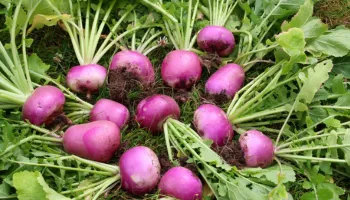Turnip
- Home
- Service Details
Properties
- High in Vitamin C
- Rich in Fiber
- Regulates Blood Sugar
- Good for Skin
- Boosts Immunity
- Heart-Friendly
- Anti-Inflammatory
- Rich in Antioxidants
Turnip – A Nutrient-Rich Root Vegetable
Turnip is a root vegetable that belongs to the Brassicaceae family. It is widely cultivated for its edible roots and leafy greens. Packed with essential nutrients like fiber, vitamin C, and potassium, turnips are a great addition to a balanced diet. Their mildly spicy and slightly sweet flavor makes them a versatile ingredient in various cuisines. Whether eaten raw, cooked, or pickled, turnips offer numerous health benefits, including improved digestion, enhanced immunity, and better heart health.
Uses of Turnip
- Used in soups, stews, and curries for added flavor and nutrition.
- Pickled turnips are popular in many Middle Eastern dishes.
- Mashed turnips serve as a healthy alternative to mashed potatoes.
- Helps in digestion due to its high fiber content.
- Aids in managing blood sugar levels.
- Acts as a natural detoxifier by flushing out toxins.
- Turnip greens are used as animal fodder.
- Grown as a cover crop to improve soil fertility.

Frequently Asked Question
Turnip is a root vegetable, but its leaves (turnip greens) are also edible.
Yes, turnips can be eaten raw in salads, slaws, or as a crunchy snack.
Yes, turnips are low in calories and high in fiber, making them ideal for weight management.
Turnips are larger and have a mild, slightly sweet taste, whereas radishes are smaller with a stronger, peppery flavor.
